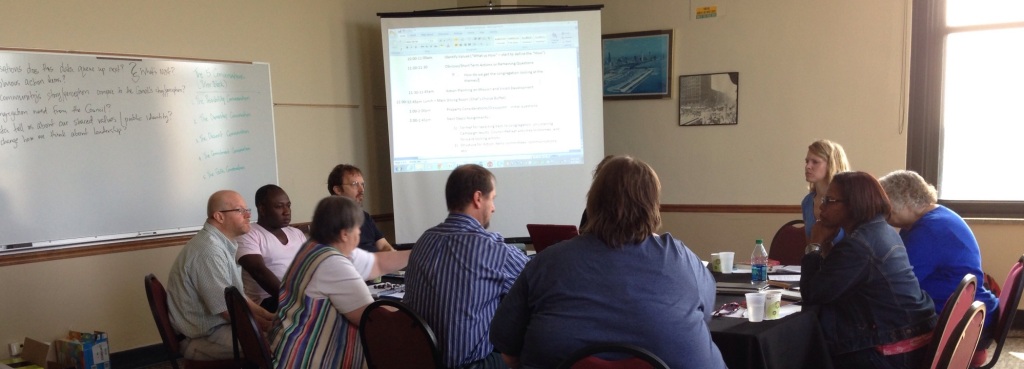Texts: Isaiah 45:1-7 + Psalm 96:1-13 + 1 Thessalonians 1:1-10 + Matthew 22:15-22
Earlier this year our Church Council met with members of the Strategic Listening Team to receive the preliminary report of the listening campaign they conducted with members of St. Luke’s. Most all of you took part in this campaign, sharing with one another what you love about our congregation, what you worry about when you consider our future, and how you tell the story of our mutual ministry. After a season of listening, we were all eager to hear what common themes might have emerged.
When Katie Baxter, who’s been chairing this team, first shared with me the Strategic Listening Team’s summary I will confess to being extremely proud of the congregation we’ve become. Here’s what you said about us:
- We are Christian. We follow Jesus who loved all conditions of people, who rolled up his sleeves to engage the world, and revealed a better way to live. We gather weekly to be healed, recharged, and sent out to continue that work.
- We are accepting. Come as you are, inside and out. You are welcome here.
- We are progressive. We’re willing to confront “the way things are” and seek new answers to old questions. We believe ordinary people can do extraordinary things.
- We are active. We are committed to balance in life, compassion for the struggling, and engagement with the world. We’re imperfect but we’re determined to make a difference.
- We are community builders. We invite you to get to know our diverse members and friends, to find your place among us, and to join us in extending our hospitality to Logan Square and beyond.
As I read that summary for the first time, I remember feeling my heart climb up into my throat as I recognized us in these words. Yes, we are welcoming, and yes, we are imperfect. Yes, we are progressive, and yes, we are Christians. Yes, Yes, Yes!
There is a spirit of daring in the way you see yourselves, a spirit of adventure and openness to the future, that is simultaneously exciting and, if I’m being honest, terrifying. You are not play acting at faith, you are wrestling with God and one another and the world in which we live. You are trying to figure out how to be good parents, and good children, and good neighbors, and good colleagues, and good citizens, and good Christians. You are giving yourself to so many people, so many projects, so many causes. You are taking life one day at a time and figuring it out as you go. You are beautiful and inspiring. You must be so tired!
 “Render therefore unto Caesar the things which are Caesar’s; and unto God the things that are God’s.” (Matt. 22:21, KJV) That’s the King James translation, I just love the poetry of it. “Give therefore to the emperor the things that are the emperor’s, and to God the things that are God’s” is the translation we’re working with. Simple enough, right? Give this world what belongs to this world, and give God what belongs to God.
“Render therefore unto Caesar the things which are Caesar’s; and unto God the things that are God’s.” (Matt. 22:21, KJV) That’s the King James translation, I just love the poetry of it. “Give therefore to the emperor the things that are the emperor’s, and to God the things that are God’s” is the translation we’re working with. Simple enough, right? Give this world what belongs to this world, and give God what belongs to God.
Except that we know, with ears that have been conditioned to listen for puzzles and parables that the world does not divide so neatly into the things ruled by the powers and principalities of this world and the things ruled by God. We hear in Jesus’s dodgy response to the trap laid out by the Pharisees and the Herodians the ongoing call to struggle with how to be a good parent, a good child, a good neighbor, a good colleague, a good citizen, a good Christian. How much of myself am I prepared to give away?
The question itself was a trap, of that much I’m sure. As one commentator on this scripture has written, “politically, just about the only thing Pharisees and Herodians have in common is that they don’t like Jesus.” As Jesus’s ministry grew, both factions were becoming more and more concerned with his waxing influence among the people. He was becoming a greater and greater threat to the delicate balance of power worked out between the emperor in Rome and the local leadership in government, in the Temple, and out in the countryside. They hoped to trap him with a question that would split his base, so they asked him about the topic that still so often splits us: they asked him about money.
“Tell us then, what you think. Is it lawful to pay taxes to the emperor, or not?” (Matt. 22:17)
Here’s the trap. If Jesus says it is lawful to pay taxes then he is siding with the Herodians, the Jews who backed King Herod, the local ruler who was beholden to Rome for his power. He’ll lose the support of the poor, those oppressed and angry with the Roman occupation. On the other hand, if he encourages the crowd not to pay taxes he may keep their support, but he will be openly defying the empire and could then be tried, jailed, even executed. Either way, the Pharisees and the Herodians think they have Jesus neutralized.
Often in the past, when I’ve considered this story I’ve put myself in the place of the crowd that followed Jesus, watching him take on the warring political factions of his day, hoping they wouldn’t trap him, cheering him on as he slips through their fingers. Over time though I sense that I, like most of us, am a Herodian or a Pharisee. I want Jesus to offer an authoritative answer that will either affirm my convictions or confirm that he is irrelevant. I want him to say something that will sound beautiful and righteous, that will seem laudable and impossible, so that I can recognize how right he is even as I let myself off the hook of living the life he calls me to live. Let him go to the cross for his glorious vision of a new heaven and a new earth, I’m just trying to get through the day in the heaven and earth we’ve got here and now.
To say that Jesus slips through their trap isn’t quite right though. First of all, it doesn’t fit with who we know Jesus to be. He’s not afraid of conflict, or to speak his mind. He has already made his attitude toward wealth perfectly clear when he told the rich young man, “go, sell your possessions, and give the money to the poor, and you will have treasure in heaven; then come, follow me.” (Matt. 19:21) So why dodge this question?
You know, it’s really only a dodge if you think it’s Jesus’s job to tell you how to live your life. It’s only a dodge if you think it’s a teacher’s job to do your thinking for you, or if you think it’s a parent’s job to solve your problems for you, or you think it’s a colleague’s job to do your work for you, or if you think it’s an elected official’s job to build your democracy for you, or if you think it’s a pastor’s job to be a Christian for you. But you don’t think these things, at least that’s not what I saw when I read the summary of the listening campaign’s findings. You don’t think our Christian faith is about having all the answers handed to you. You believe that following Jesus is a messy business that requires deep listening, respectful disagreement, careful discernment, and confidence that the God who called us together is with us each step of the way.
The Pharisees and Herodians ask, “tell us then, what you think.” In essence, Jesus replies, “no, tell me what you think. What belongs to Caesar and what belongs to God?” On one level the answer is clear: everything comes from God, so everything belongs to God, so everything should be rendered to God. On another level, nothing is clear. As the passage from Isaiah reminds us, God worked through Cyrus, the foreign king over Israel. God works through the governments and institutions of this world. And as the passage from Thessalonians points out, this world and its governments and institutions persecute those who are faithful to God’s vision for a world redeemed by love for love, for peace with justice. The answers aren’t as clear as “yes, pay your taxes” or “no, don’t pay them.” The answers aren’t as clear as “yes, military action” or “no military action.” The answers aren’t even as clear as “yes, marriage equality” or “no marriage equality.”
Which is not the same as saying that there aren’t legitimate, strongly held, faithfully arrived at convictions that motivate our public speech and action. It’s just to say that Jesus, like any good teacher, won’t do all our work for us. Jesus won’t fall prey to the intellectual or political traps we lay that try to neutralize him by making his call to discipleship so ideological that it can be ignored. Instead, Jesus lays a question before us and demands that we really listen to it, that we consider its many angles, that we search our religious tradition, our scriptures and the witness of those who have gone before us. Then, having done that, that we tell the world what we think with courage and humility knowing that each of us is working out our own salvation with fear and trembling. (Philippians 2:12)
This is one of the reasons we gather together as a church — to practice giving our testimony, to model what it looks like to say what we think, to listen to one another as we each work out what it means to follow Jesus in our lives and in the world. In this, you are a great encouragement to me. Your witness strengthens my faith on a daily basis as you give yourselves to the raising of your children in ways that nurture in them peace, love and compassion; as you support your spouses and care for your aging parents; as you devote yourselves to your work, your crafts, your art, your writing, your activism; as you engage with elected officials and community organizations to build the society you want to leave to those who follow us; as you offer yourselves to the life of this congregation and God’s church throughout the world. You do not divide the world into Caesar’s or God’s. Instead, you live with the awareness that each of us, you and me and even Caesar in all his manifestations, are part of the world God loves, and is reforming.
As I celebrate eight years of ministry with and among you this week, I am so grateful for the spirit of daring and hope you have brought into my life. Together we have been living a life in which questions are answered with more questions, and the answers are only found when we are together and not divided.
Amen.
